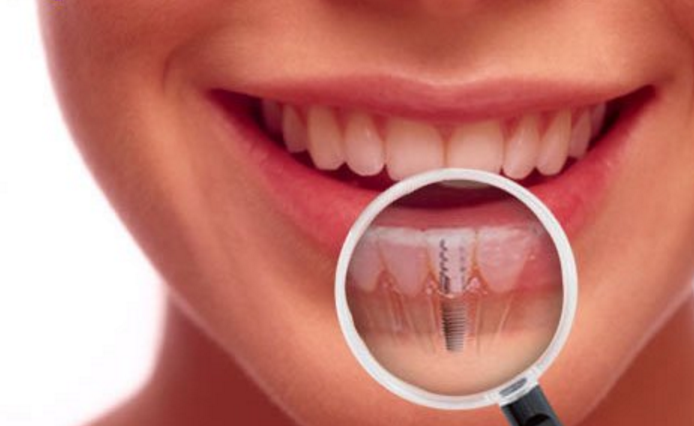
Dental implants are without a doubt the best option when repairing a damaged tooth or teeth. Dental implants are artificial tooth roots that provide a solid and sturdy base for fixed, replacement crowns. While other tooth repair options (dentures, bridges, or flippers) can be helpful, they do not give the natural feel that implants do. Because they feel, fit, and function like natural teeth, dental implants have quickly become the new standard when dealing with a damaged tooth.
There is a long process that goes along with getting successful dental implants, involving a team of oral surgeons and a day to day dentist. First, a person must get surgery to remove every piece of the remaining damaged tooth from the gum. Doctors install a medical-grade titanium (or in some instances gold) implant fixture where the damaged tooth used to be. After the surgery is complete with the new implant, the patient is given “temporary crowns” for the next 3-6 months while the implant fuses to the living bone cells of the jaw. Once the implants have fused with the bone, the dentist will remove the temporary crowns and install permanent ones. These crowns have been specifically created to match the remaining healthy teeth in one’s mouth so that other people won’t even be able to tell the implants are there in the first place.
With dental implants, a person can go on living his/her life knowing he/she will not have to worry about how his/her teeth look or feel. The patient will be able to eat and chew with no irritation, and his/her smile will be beautiful. If a person struggles with dental issues and can’t seem to find a satisfying solution, dental implants could be the right choice. Beyond the physical appeal, many people also find dental implants to be a great choice based off of health reasons alone. Dental implants can help prevent bone loss in the jaw by integrating with the bone and providing a stimulus that keeps the jaw bone from deteriorating. The longevity of dental implants should be taken into account as well. If taken care of properly, dental implants can last a lifetime.
Dental implants can replace a single tooth, multiple teeth, or in some cases a full upper or bottom row of teeth.
Comparing Dental Implants to Other Options
Flipper
Longevity: 1-3 years
Preservation of healthy adjacent teeth: Yes
Transmission of force to: adjacent teeth
Prevent bone loss & preserve facial appearance: No
Requirement for periodic adjustments: Yes
Accelerated loss of adjacent teeth: Yes
Dentures (partial or full)
Longevity: 5-7 years
Preservation of healthy adjacent teeth: Yes
Transmission of force to: adjacent teeth/ gums
Prevent bone loss & preserve facial appearance: No
Requirement for periodic adjustments: Yes
Accelerated loss of adjacent teeth: Yes
Bridge
Longevity: 7-10 years
Preservation of healthy adjacent teeth: No
Transmission of force to: adjacent teeth
Prevent bone loss & preserve facial appearance: No
Requirement for periodic adjustments: Yes
Accelerated loss of adjacent teeth: Yes
Implants
Longevity: Lifetime
Preservation of healthy adjacent teeth: Yes
Transmission of force to: bone
Prevent bone loss & preserve facial appearance: Yes
Requirement for periodic adjustments: No
Accelerated loss of adjacent teeth: No
